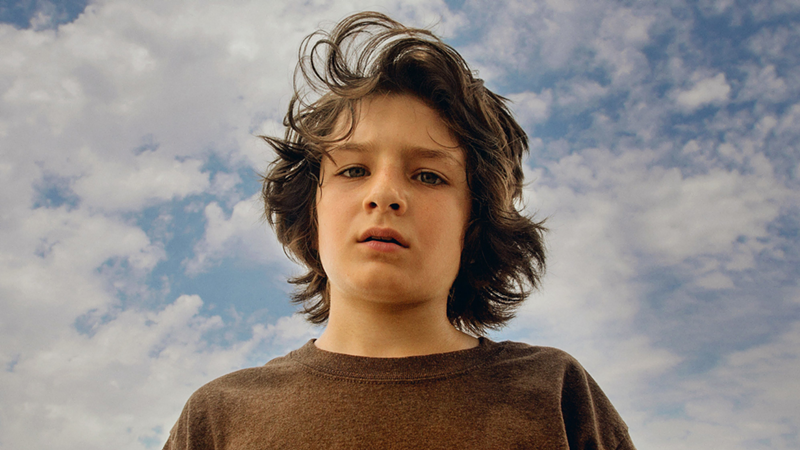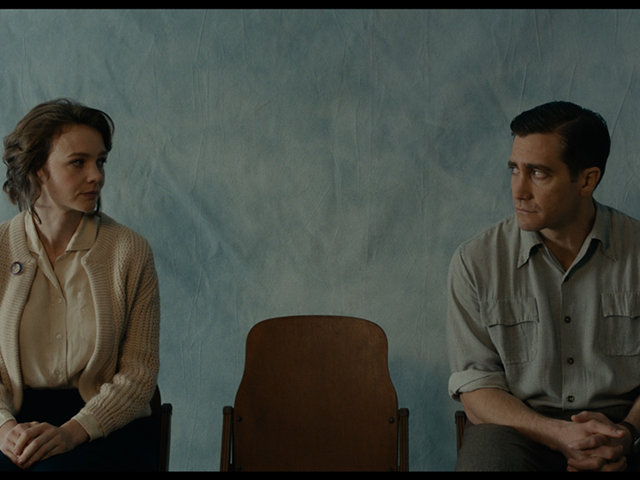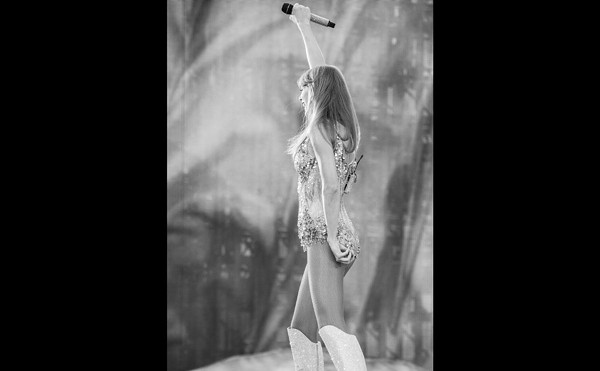Disclaimer: I was born smack dab in the middle of the ’90s — 1996 — so I know decade gatekeepers may say that I can’t really understand the nostalgic hues of Jonah Hill’s Mid90s, set in L.A.; I didn’t live it. But Hill’s directorial debut transcends time and mines at a more universal feeling: The nagging aimlessness many young people face. Like slacker cult classics Clerks and Kids, Mid90s is more about navigating the feelings of growing up rather than dwelling on any particular moment or takeaway.
The film opens on 13-year-old Stevie (Sunny Suljic) being beaten up by his older brother Ian, a brooding force portrayed by Lucas Hedges. They scream and tussle, and Stevie — donning a Street Fighter T-shirt — is told to stay out of his older bro’s room and stop pilfering through his CDs. The beating is recurrent, unbeknownst to their single mom, Dabney. Hedges portrays the character with restrained brilliance, as scenes show him slurping orange juice directly from the carton, mumbling hateful comments and sporting buzzed hair, tiny hoop earrings and a wide breadth of emotional distance. Equally as troubling is watching Stevie self-harm. After stealing money from his mom to buy a new skateboard (encouraged by Ian), he furiously rakes a hairbrush on his upper thigh and stomach, ravaged by guilt. In other scenes he strangles himself with a wire and punches himself until he cries in frustration.
As someone who inflicted similar pain on themselves at that age (scratching, biting and punching), the scenes were hard to view, but also cathartic — I didn’t consider those self-inflicted acts a form of self-harm until I went to college. So, I appreciated the relatable portrayal. At one point, an older boy, Ray (Na-kel Smith) tells Stevie that he takes “the hardest hits of anyone I’ve ever seen; you know you don’t have to do that.”
And those words could very well act as the thesis statement of the film. Pain, emotion, restraint and the need to release underscore most scenes in Mid90s. Be it Stevie attempting a skate trick he wasn’t ready for and tumbling to the ground. Or the way that the lovingly nicknamed ‘Fuckshit’ self-medicates with drugs and alcohol — letting his grades slip and passion for skating dwindle while claiming not to give a shit. Or how the shy ‘Fourth Grade’ escapes through the lens of his camera, capturing every kickflip, ollie, wipe-out and carve.
On one hand, it’s a story about a young, lonely boy finding friendship in a group of ragtag skaters after wandering into a skate shop, becoming fascinated by the culture and edging himself into the crew. On another note, it’s a portrait of a broken, middle-class family trying to connect, but never quite finding ways to express themselves. Zoom out, and it’s really a slice-of-life film about a boy emerging into his teenage years, finally realizing that rebellion is a possibility. He finds this new sense of self in a group of skaters that are more akin to a dysfunctional family unit.
Ruben (Gio Galicia), the other younger member of the pack, has a rocky homelife. When Fuckshit drives the kids to their respective homes, we see him go up to his apartment door and promptly leave, skating away to avoid his mother. One could assume that he bottles this anger and channels it through jealousy toward Stevie, as the pack gets closer to him.
The mother (Katherine Waterston), who picks up part-time work as a hooker, often feels just as lost as her sons — despite how hard she tries to be open and connect.
There’s no monumental point or heavy plotline. The viewer is left with loose, extracted memories. Like a DIY skate-vid, the film moves from moment to moment. It glides against pavement, and the trajectory is to, well, nowhere in particular. It’s about the movements in-between, and the essence of a subculture steeped by restlessness. In Mid90s, it’s evident that director Hill was chasing authenticity. As each scene slides into the other, the glossy L.A. sun permeating the vibes, Hill is felt wholly. He doesn’t shy away from showcasing the era’s messier aspects — the crass, sometimes slur-filled language, the glorification of drugs and apathy in the guise of being cool. The good slices are there, too. See: a killer Hip Hop and College Rock-infused soundtrack, slacker slapstick and good vibes. It’s a genuine portrayal of growing up and becoming one’s self; it just happens to also be about skating.
By the end, after a car crash that leaves Stevie in the hospital and both of his families — biological and newly-found — gathered around his bedside, we’re left meditating on the catharsis skaters understand best: Falling down and getting back up. As Fuckshit puts it: “That’s why we ride a piece of wood. Like, what that does to somebody’s spirit.” (Now playing) Grade: B+







